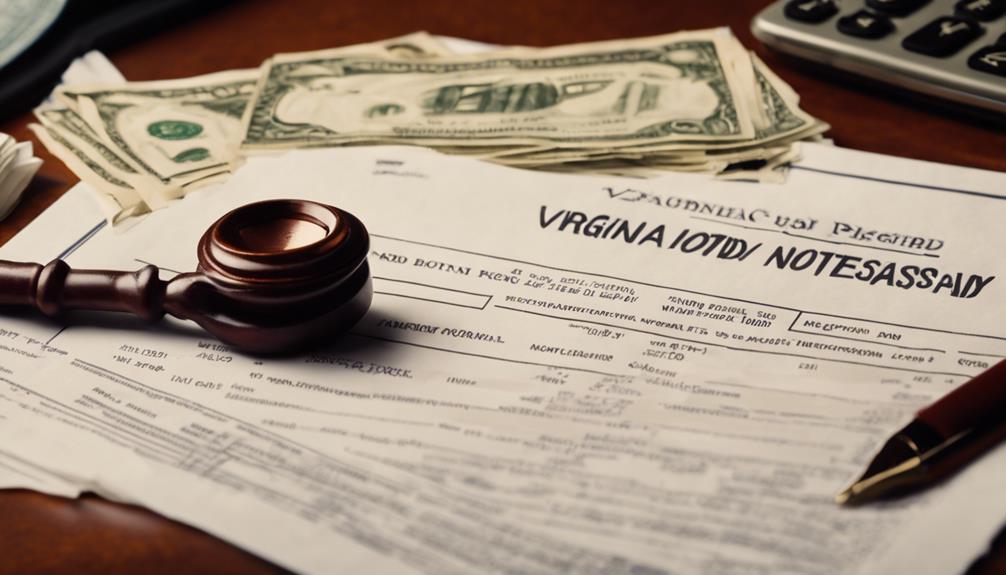When you consider becoming a notary in Virginia, it's essential to understand the significance of the Notary Public Bond. This $25,000 financial guarantee not only safeguards the public against potential mistakes but also underscores your commitment to professionalism. You'll need to navigate the requirements for obtaining and renewing this bond every four years. But what happens if you fail to meet these obligations? The implications might be more far-reaching than you think, prompting a closer look at the responsibilities tied to your role as a notary.
Understanding Notary Public Bonds

Understanding Notary Public Bonds is essential for anyone looking to become a notary in Virginia. A notary public bond acts as a form of protection for the public, ensuring that you adhere to the laws and regulations governing your duties.
When you become a notary, you're required to obtain a bond, typically for a sum of $15,000. This bond essentially guarantees that if you make a mistake in your notarial duties, there's financial recourse for those affected.
Think of it as a safety net. If someone suffers a loss due to your negligence or misconduct, they can file a claim against the bond. It's a way to hold you accountable for your actions, ensuring that you take your responsibilities seriously.
Securing your bond usually involves working with a bonding company or insurance provider, where you'll pay a premium based on your creditworthiness and the bond amount.
It's crucial to maintain your bond throughout your tenure as a notary, as a lapse could jeopardize your ability to serve. Therefore, understanding these bonds is a critical step in your journey to becoming a successful notary in Virginia.
Purpose of the Bond
The primary purpose of a notary public bond is to protect the public and ensure accountability. When you act as a notary, you're entrusted with verifying important documents and transactions. The bond serves as a financial safety net for individuals who may suffer losses due to your negligence or misconduct while performing notarial duties.
If you make a mistake or fail to fulfill your obligations, the bond can cover damages up to a specified amount. This means that if someone suffers a loss because of your actions, they can file a claim against the bond to seek compensation. This not only safeguards the public but also reinforces the trust placed in you as a notary public.
Additionally, having a bond can enhance your credibility and professionalism. It shows clients and the community that you take your responsibilities seriously and are committed to maintaining high standards in your notarial practice.
Bond Amount Requirements

When applying to become a notary public in Virginia, you'll need to secure a bond with a specific amount set by state regulations. The required bond amount is $25,000. This amount serves as a financial guarantee to protect the public from potential misconduct or negligence on your part while performing notarial acts.
It's essential to understand that this bond isn't a personal insurance policy. Instead, it's a safeguard that provides compensation to individuals who may suffer losses due to your actions as a notary. If a claim is made against you, the bond ensures that funds are available to cover damages up to the bond limit. You'll be responsible for any amounts exceeding that limit.
When you select a bonding company, make sure they're authorized to issue notary bonds in Virginia. They'll help you navigate the process and ensure you meet all legal requirements.
How to Obtain a Bond
To obtain a notary bond in Virginia, you'll first need to choose a bonding company authorized to issue notary bonds in the state.
Research different companies to find one that suits your needs. Look for reliable providers with good customer reviews and competitive rates.
Once you've selected a bonding company, you'll need to complete an application. This typically involves providing your personal information, including your name, address, and contact details.
Be prepared to share your notary commission details as well.
After submitting your application, the bonding company will usually conduct a background check. This process can vary in duration, so it's best to ask about the expected timeline.
Once approved, you'll receive your bond, usually in a form of a certificate.
Bond Providers in Virginia

After securing your notary bond, it's important to choose the right bond provider in Virginia. You'll want a provider that's reliable, experienced, and knowledgeable about the notary landscape.
Look for companies that specialize in notary bonds, as they'll understand your specific needs and the requirements set by the state. One option is to check with your local insurance agents or financial institutions. Many of them offer notary bonds and can guide you through the process.
You might also consider online bond providers, which often have competitive rates and quick processing times. Just make sure they're licensed to operate in Virginia.
When comparing bond providers, pay attention to customer reviews and testimonials. Reliable service and good communication are key factors that can make your experience smoother.
Additionally, look for providers that offer excellent support in case you have questions or need assistance. Lastly, don't forget to inquire about the costs associated with the bond.
Prices can vary, so it's wise to shop around and find a provider that fits your budget while still offering quality service. Your choice of bond provider can make a significant difference in your notary journey.
Notary Responsibilities and Liabilities
As a notary public in Virginia, you hold significant responsibilities and potential liabilities that are essential to understand. Your primary duty is to act as an impartial witness in the signing of important documents, ensuring that all parties involved are who they claim to be. This means verifying identities through proper identification and confirming that signers are doing so willingly and without coercion.
You must also be meticulous in keeping accurate and detailed records of all notarizations. Failing to maintain these records can lead to legal issues and potential liability for any errors or omissions. If a mistake occurs, you could be held responsible for any damages that result, which is where your bond comes into play.
Additionally, you need to stay informed about Virginia's notary laws and regulations. Ignorance isn't an excuse, and any violation can expose you to legal penalties.
Renewing Your Notary Bond

Understanding your responsibilities as a notary public in Virginia also involves knowing the importance of renewing your notary bond. This bond protects you and your clients from potential errors or misconduct. Typically, your bond lasts for four years, so it's crucial to keep track of its expiration date.
When it's time to renew, you'll need to go through a few steps. First, ensure you meet all the qualifications required by the state. This might include completing any necessary training or continuing education.
Next, contact your surety company to initiate the renewal process. They'll guide you through the paperwork and any fees involved.
Once you've submitted the required documents, you'll receive a new bond certificate. After that, don't forget to file this certificate with the Virginia Secretary of the Commonwealth.
It's essential to keep your bond active to maintain your notary commission and protect your professional integrity.
Common Questions About Bonds
When it comes to notary bonds, many people have common questions that can help clarify their role and responsibilities. One frequent question is, "What exactly is a notary bond?" Essentially, it's a type of insurance that protects the public from any mistakes or misconduct by the notary. If you're found liable for damages due to errors, the bond can cover those costs.
Additionally, understanding the surety bond services available can help ensure you obtain the right bond for your needs.
Another common query is, "How much does a notary bond cost?" Costs can vary based on the bond amount and the provider you choose, but it typically ranges from $50 to $100 annually.
You might also wonder, "Is a bond the same as insurance?" While related, they're not the same. A bond guarantees that you'll perform your duties correctly, while insurance covers personal liability.
Lastly, people often ask about the bond's duration. Most notary bonds in Virginia last for four years, aligning with your commission term.
Make sure you renew it before it expires to maintain your notary status. Understanding these key points can help ensure you're well-prepared for your duties as a notary public.
Conclusion
In summary, obtaining a Virginia Notary Public Bond is essential for your role as a notary. It not only protects the public but also reinforces your commitment to professionalism. Remember to keep your bond updated every four years and stay informed about your responsibilities to avoid potential liabilities. If you have any questions about the bonding process or your obligations, don't hesitate to reach out to bond providers or state resources for assistance.


